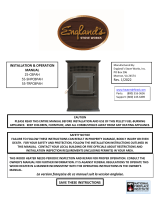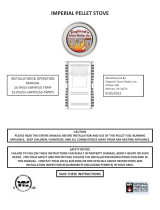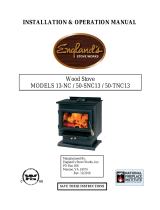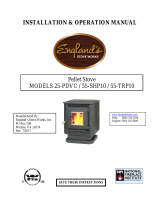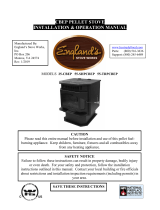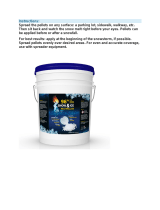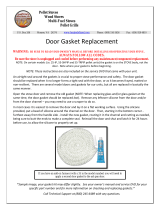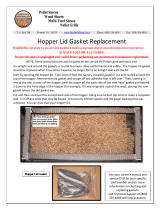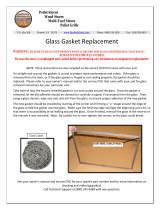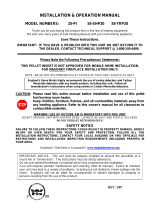
16
Convection Blower
The Convection (room air) Blower (Part # PU-4C447) is located on the left side of the unit and
can be removed by disconnecting the power leads and removing the four mounting screws. Once
this is done, the blower w ill slide out of the stove. This procedure can be reversed to install a new
blower.
Combustion Blow er
To replace the Combustion (exhaust) Blower (Part #PU-076002B), the power leads and the
pellet vent pipe must be disconnected. Next, remove the screws that hold the blower to the steel
exhaust tube and slide the blower from the stove. Note: There is a Combustion Motor Gasket (Part
PU-CMG), which allows you to remove the motor from the Combustion Blower housing, clean your
stove, and replace the motor and gasket without having to remove the entire Combustion Blower. If
cleaning your blower, the blower impeller, blower tube and steel blower exhaust tube on the unit
should be brushed and vacuumed. However, if you must remove or replace the entire
Combustion
Blow er, a new blower flange gasket (Part # PU-CBG) should be added between the blower flange
and the steel exhaust tube.
Vacuum Switch
This unit is equipped w ith Vacuum Shut Dow n Switches (Part # PU-VS and CU-VS), which help
control various functions of the unit. If an operational error occurs in the unit, a sw itch will either
stop the top (feed) auger or shut the unit off; if the unit turns off an E- 1 Code (error code) will
appear in the Heat Range and Blow er Speed windows of the Control Board. Situations which could
cause this include pow er failure, Combustion Blower failure, improper flue installation, a blocked
flue (from rodents, nests, etc.), or “dirty burning” from burning improper fuel (see “Important
Information” at the beginning of the manual).
Gaskets
IMPORTANT: IMPROPER GASKET MAINTENANCE, INCLUDING FAILURE TO REPLACE
GASKETS, CAN CAUSE AIR LEAKS RESULTING IN SMOKE-BACKS. CHECK
GASKETS OFTEN FOR AIRTIGHT SEAL AND REPLACE AS NECESSARY. IT
IS MANDATORY TO REPLACE GASKETS AT LEAST EVERY TWO YEARS.
This unit comes with a 3/4” rope gasket around the door that should be replaced at least every
two years. To replace the door gasket (Part # AC-DGKC), the old gasket must first be removed
entirely — prior to adding the new adhesive, you may have to scrape the old cement from the door
channel. Once the cement and gasket have been added, the door should be closed and latched for
twenty-four hours to allow the cement to harden.
If you are replacing the window gasket (Part #AC-GGK), the new gasket w ill already have
adhesive on one side. Remove the paper on the adhesive side and place the gasket around the
outside edge of the glass by forming a “U” w ith your fingers and placing the gasket around the
glass.
It is important to change the hopper lid gasket if it shows any wear. Be sure to replace the
hopper lid gasket at least every two years, or sooner if necessary.
Note: There is a Combustion Motor Gasket (Part PU-CMG), w hich allow s you to remove the
motor from the Combustion Blower housing, clean your stove, and replace the motor and gasket
without having to remove the entire Combustion Blower. How ever, if you must remove or replace
the entire Combustion Blow er, a new blow er flange gasket (Part # PU-CBG) should be added
between the blower flange and the steel exhaust tube.
Finish
This new unit has been painted w ith High-Temperature Paint (AC-MBSP) that should retain its
original look for years. If the unit should get w et and rust spots appear, the spots can be sanded
with plain steel wool and repainted. We recommend this paint, as others may not adhere to the
surface or withstand the high temperatures.
Glass
This unit has a 9” x 9” ceramic glass (Part #AC-G9, comes with gasket) in the viewing door.
Surface scratches are acceptable and normal, but if this glass becomes cracked in any area, the
unit should be shut down and the window replaced w ith this high-temperature ceramic glass.




















